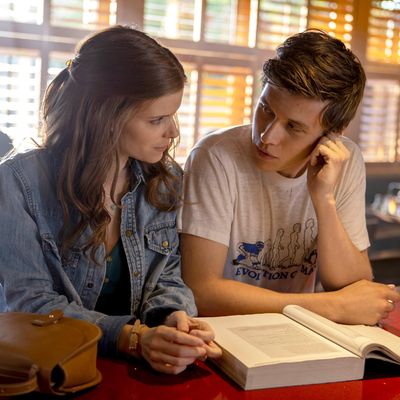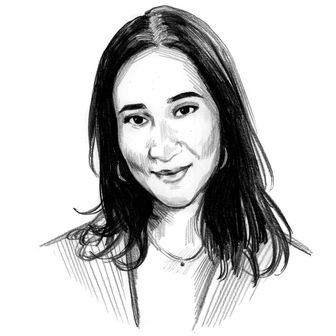
In 2013, Hannah Fidell wrote and directed her first feature film, A Teacher, about a high-school teacher who begins a sexual relationship with her student. Now, after seven years, the Me Too movement, and a different cultural conversation around assault, abuse, and power, A Teacher is back as an FX television show.
But as Fidell tells it, “the character and creative intentions of the project are actually quite different.” In the FX version, Kate Mara plays a high-school English teacher named Claire Wilson, who begins an intimate sexual relationship with her 17-year-old student, Eric (Nick Robinson). While the original film ends when the relationship ends, the series takes it several steps further. Not only does the latter half of the show explore consequences for the abuser and the warped logic she uses to rationalize her behavior, it looks more closely at the long-term trauma experienced by the survivor. The Cut spoke with writer-director Hannah Fidell about the series, her own experience with assault, and what she hopes to achieve with this version of her story. (Some spoilers ahead.)
What inspired you to write this story? Both the original film and the FX version.
I’ve had my own experience with sexual assault. Although it wasn’t with a teacher, it was with someone who I considered a friend and who broke my trust in a very deep way. So I was really interested in trying to understand how he was able to reconcile his behavior, and I was working through that when I wrote the movie. That was my way in: understanding the lies that [the teacher] is telling herself in order to get through the day.
There’s a scene at the very end where Claire and Eric meet ten years in the future. She seems to be doing fine — a husband, kids, a career — and Eric is a wreck. They have a conversation and it’s clear that Claire is still in denial about her role in the abuse. What was it like writing that scene? Did you speak to the man who raped you to help nail down the warped logic Claire was using?
My experience is very different in that I actually wanted to press charges. They wouldn’t give them. I did speak to him, and in a lot of ways, that scene is what I wished that I could have said to him. The fact is that the process of reconciling major life events takes time.
A lot of my traumatic experience — and also as you see in the show, Eric’s — is in the aftermath. Many sexual-abuse resources say that that’s the more traumatic part, the way the people around you deal with [rape and assault] even more so than the actual act itself. So it takes time to be able to understand what happened. And we found out in our research with this particular kind of sexual abuse, it takes longer for men and boys to see themselves as victims because of that double standard that the show deals with.
The show really delves more into the survivor’s perspective than the film did. Why did you make that choice this time around?
As a society and as a culture we were talking about victimhood in a way that we never had. But I was able to explore in a way that I wasn’t emotionally ready to [before], the long-term consequences for the abuser and a different facet of consent, which the second half of the show really delves into.
The film version of A Teacher was released in 2013 — what is it like telling a similar story in a post–Me Too society?
We actually enriched and developed the show with HBO immediately after the film. But it wasn’t the right time. There’s no way we could have made the show without the Me Too reckoning. And also [I couldn’t have personally] without the time that had elapsed. I don’t think we were even culturally really ready to talk about the double standard or this question of whether survivors and abusers wear the scarlet letter for the rest of their lives.
Claire is not necessarily outwardly crazy. She’s not the man in the van luring children with candy. Nick looks like that guy who we all went to school with who looks like an adult, but is actually 17. And so the fact that even though he was a consenting party it can never be consensual because she’s in a position of power, which is what so much of Me Too was really about — the abuse of power.
There are parts of the show that feel almost empathetic towards Claire. You feel kind of bad for her. How did you toe the line between being sympathetic and damning? What would you say to critics who don’t think you’re being harsh enough?
I wanted the audience to come to their own conclusions about her. And I didn’t want to make it easy. I just think in order to have this sort of character, you can’t just have like an archetypical villain. Part of the way we deliberately structured the show was by going through Eric’s perspective, especially in the first three episodes. What that means is seeing Claire in the way that Eric does, which is in this completely enamored kind of way. We wanted to make it complicated.
And there’s that back half of the show after her she’s gone to jail, after she moves back to her brother’s house. I don’t think it’s necessarily meant to be sympathetic, but it’s like this is the reality. And the reality is that her life sucks, and she can’t move on.
What’s your goal with the show?
I hope that it brings to light … [what is] happening in our country, because with the rise of social media, I think the boundaries between teachers and students have blurred even further, and there are no organizations really tracking the number of cases where teachers are taking advantage of their students. I hope that it can spark some sort of discussion.



